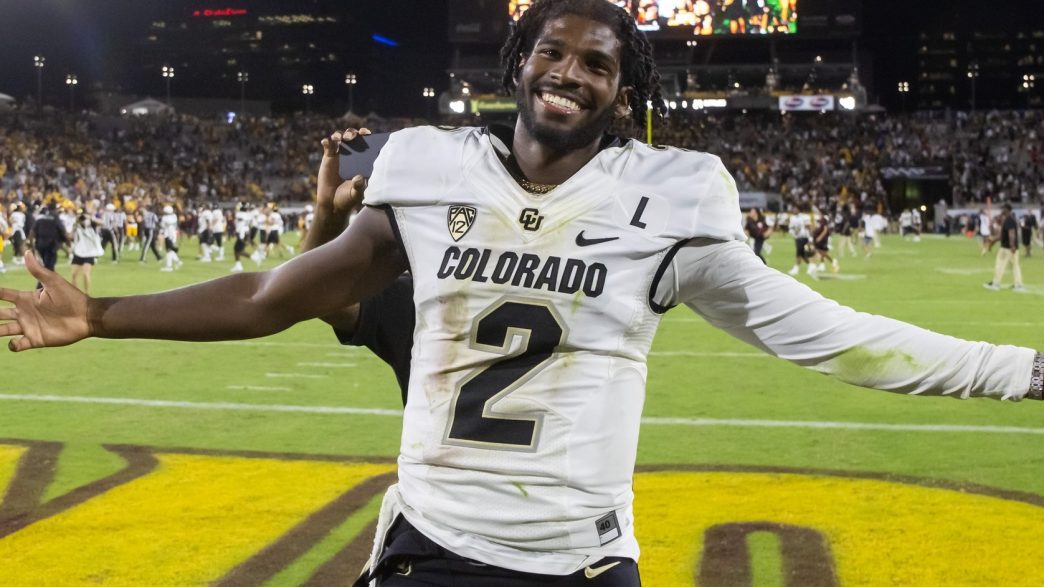Deion Sanders just stirred the pot with a revelation that has college football fans buzzing. During his appearance on “The Bret Boone Podcast,” Coach Prime made a startling comment about his son, Shedeur Sanders, the standout quarterback for Colorado. He suggested that Shedeur might not have attended a single in-person class during his college tenure. It’s a statement that has sent shockwaves through the college football community, racking up thousands of likes on social media and igniting a passionate debate about the evolving landscape of college athletics.
Let’s unpack that statement, shall we? Shedeur isn’t just any quarterback; he’s one of the brightest young talents in the game, showcasing poise, incredible arm strength, and sharp decision-making. When Deion speaks, it’s not just idle chatter; he’s a legendary figure who has drawn immense attention to Colorado’s program—think of it as turning the spotlight on a Friday night game. This comment from Prime doesn’t just raise eyebrows; it compels us to reconsider the very notion of a “student-athlete.” If Shedeur has indeed navigated his college career primarily through online classes, it fundamentally alters our understanding of what the college experience means today.
The response has been equally compelling. On social media, fans have split into two camps, much like a well-executed football play. On one side, you have the traditionalists lamenting the erosion of the college experience. They argue that students should be physically present in classrooms, engaging with peers and soaking up the full college experience. They view this shift as a dangerous trend leading towards football-centric “factories” where academics might take a backseat. Conversely, others are embracing this modern approach. They argue that online classes offer players like Shedeur the flexibility to maximize their performance on the field without the logistical headaches of a conventional campus life. In an era dominated by Name, Image, and Likeness (NIL) agreements and transfer portal chaos, this could simply be the natural evolution of the student-athlete role.
What’s truly captivating is how this single quote throws open the door to a nuanced discussion about balancing academics and athletics. Shedeur isn’t slacking off; you can bet he’s putting in the legwork to maintain his grades while spearheading Colorado’s offense. But if he’s completing those tasks online, it introduces a new paradigm. This is likely a strategic choice, perhaps orchestrated by Deion himself, to keep his son focused on football while still fulfilling academic requirements. If there’s one person who knows how to ready an athlete for the big leagues, it’s Prime—he’s qualified with both his experience and success in the game.
Now, let’s think about what this means for the future. If Shedeur’s experience mirrors a trend toward online education and an emphasis on performance, what does that signal for college football moving forward? With the ever-increasing demands of conference realignments and the pressures of playoff expansions, could remote learning be the key to maintaining an edge? Minimizing travel time means more room for film study and honing skills on the practice field. Yet, this raises an important question: are we sacrificing the richness of the traditional college experience? Those quintessential aspects—tailgating, rivalries, random late-night debates in dorms—do they matter less when a star player has never even set foot on campus?
Shedeur’s situation isn’t just a Colorado-specific storyline; it could very well be a glimpse into the future of college sports. Deion has always been a trendsetter, and if he’s paving this path for his son, other coaches are undoubtedly taking note. Imagine a future where top prospects navigate their college years like Shedeur—high academic performance through virtual learning while simultaneously focusing on the NFL Draft. It’s an intriguing thought as we watch how prepared and engaged Shedeur appears every time he drops back to throw.
So, yes, Deion’s revelation has sparked serious interest, and rightfully so. It transcends the story of one remarkable quarterback; it’s about the trajectory of college football itself. While Shedeur commands the field, he’s also balancing virtual finals. Whether you find this approach admirable or concerning, it’s undeniably a storyline that keeps fans engaged, intertwining elite athletic prowess with profound questions about the nature of college sports today. And if Colorado continues to thrive with Shedeur leading the charge, the rest of the college football world might just have to take notice.







